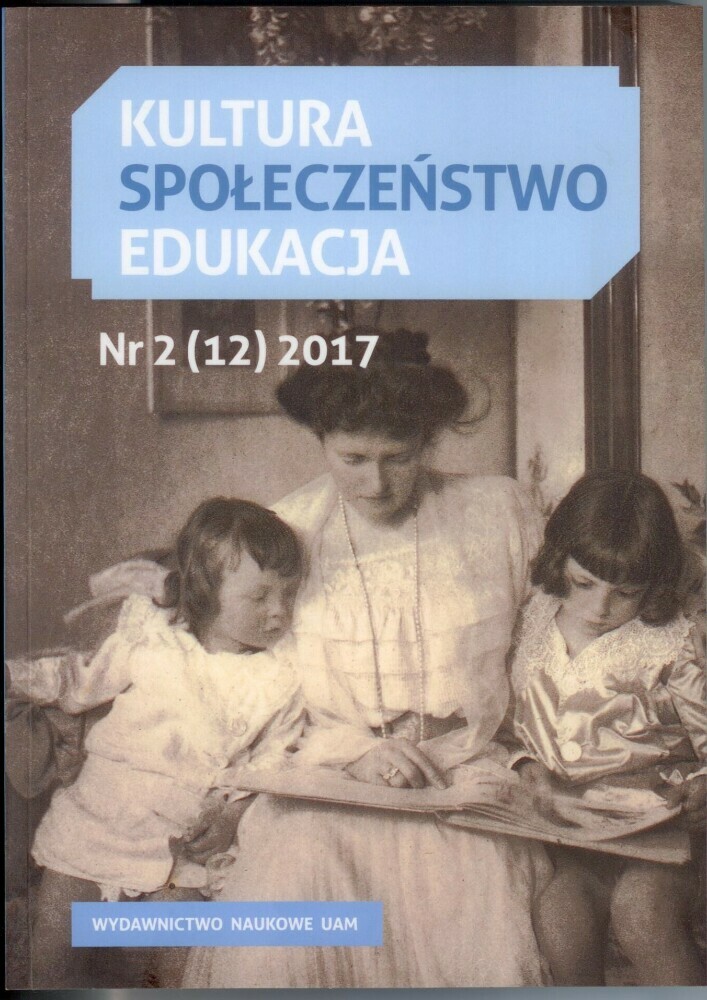Abstrakt
The aim of this paper is to present the conception of learning as a discursive space. It presents the existing research in the field of critical discourse theory, cultural processes of learning as well as dialogic theory of learning. Different aspects of discourse of learning are discussed, including learning as a space for identity creation processes. Furthermore the issues of empty signifiers in a discourse of learning as well as cultural aspects of the discourse of learning and its consequences for identity creation processes are raised.
Bibliografia
Biesta G.J.J. (2010). Good Education in an Age of Measurement. Ethics, Politics, Democracy. London.
Burgos R.B. (2003). Partnership as a floating and empty signifier within educational policies: the Mexican case. [W:] M.B. Franklin, M. Bloch, T. Popkewitz (eds.). Educational Partnerships and the State: The paradoxes of Governing Schools, Children, and Families. Basingstoke, s. 55–79.
Evans R. (2013). Learning and knowing. Narratives, memory and biographical knowledge in interview interaction. „European Journal for Research on the Education and Learning of Adults” 4(1), s. 17–31.
Evans R., Kurantowicz E. (2009). Learning in changing educational landscapes: migration at the margins and biographical narratives of identity in transition. „Between Global and Local”, s. 65–78.
Field J. (2000). Lifelong Learning and the New Educational Order. London.
Gee J.P., Green J. (1998). Discourse analysis learning and social practice: a methodological study. „Review of Research in Education” 23, s. 119–169.
Hansen A.D. (2005). Politics and metaphor – a discourse theoretical analysis, Paper to be presented at ECPR conference.
Hicks D. (1996). Contextual inquiries: A discourse-oriented study of classroom learning. [W:] D. Hicks (ed.). Discourse, Learning, and Schooling. New York.
Howarth D. (2008). Dyskurs. Warszawa.
Jurgiel-Aleksander A. (2013). Doświadczenie edukacyjne w perspektywie andragogicznej. Studium biograficzno-andragogiczne. Gdańsk.
Jurgiel-Aleksander A., Jagiełło-Rusiłowski A. (2014). Dyskurs uczenia się przez całe życie: administrowanie kompetencjami czy pytanie o ich sens i znaczenie? „Rocznik Andragogiczny” 20, s. 65–74.
Koschmann T. (1999). Toward a dialogic theory of learning: Bakhtin’s contribution to understanding learning in settings of collaboration. [W:] C. Hoadley, J. Roschelle (eds.) „Proceedings of the 1999 conference on Computer support for collaborative learning. International Society of the Learning Sciences, Palo Alto, California. Mahwah, NJ.
Laclau E. (2009). Rozum populistyczny. Wrocław.
Land R., Rattray J., Vivian P. (2014). Learning in the liminal space: A semiotic approach to threshold concepts. „Higher Education” 67(2), s. 199–217.
Menard-Warwick J. (2005). Transgression narratives, dialogic vocing, and cultural change. „Journal of Sociolinguistics” 9(4), s. 534–557.
Mercer N. (2004). Sociocultural discourse analysis. „Journal of Applied Linguistics” 1(2), s. 137–168.
Mignolo W. (2002) The geopolitics of knowledge and the colonial difference. „The South Atlantic Quarterly” 101(1), s. 57–96.
Montessori N.M. (2011). The design of a theoretical, methodological, analytical framework to analyse hegemony in discourse. „Critical Discourse Studies” 8(3), s. 169–181.
Norton B. (1997). Language, identity, and the Ownership of English. „TESOL Quarterly” s. 409–429.
Norton B. (2000). Identity and Language Learning: Gender, Ethnicity and Educational. Change.
Pavlenko A., Norton B. (2007). Imagined communities, identity, and English language learning. „International Handbook of English Language Teaching”, s. 669–680.
Sfard A. (1998). On two metaphors for learning and the dangers of choosing just one. „Educational Researcher” 27(2), s. 4–13.
Szkudlarek T. (2007) Empty signifiers, education and politics. „Studies in Philosophy and Education” 26(3), s. 237–252.
Wickman P.O., Östman L. (2002). Learning as discourse change: A sociocultural mechanism. „Science Education” 86(5), s. 601–623.
Young R. (1990). White Mythologies. Writing History and the West. London-New York.
Licencja
Prawa autorskie (c) 2019 Monika Popow

Utwór dostępny jest na licencji Creative Commons Uznanie autorstwa – Bez utworów zależnych 4.0 Międzynarodowe.
